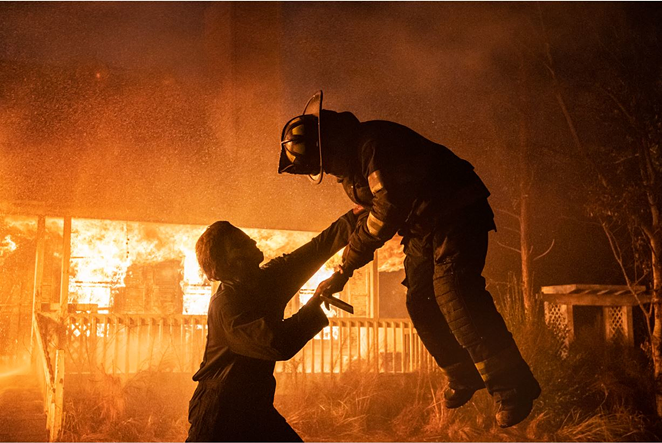
I love October. I love seeing friends revisit their favorite horror franchises because it often prompts fun debates about the lasting imprint of certain movie maniacs and the films that helped define them.
For me, the best pound-for-pound, all-around-exceptional slasher film ever made is John Carpenter’s “Halloween.”
Like its titular shape, Michael Myers, the original 1978 “Halloween” has withstood time and remains the most vital, fully-formed slasher experience ever created. And that’s before you even consider the 11 (?-!-?) sequels, reboots and odd outliers that make up its cinematic oeuvre.
Halloween Kills
4.5 out of 5 stars
Now playing
Personally, I have always championed “Halloween III: Season of the Witch,” and “Halloween: The Curse of Michael Myers,” just because of how bizarre and batshit crazy both are.
But the real truth is that until director David Gordon Green and Danny McBride teamed up in 2018 for their take on the classic, which eschewed every follow-up and skipped past all the tangled mythology built over 40 years, there had never been a truly good sequel to Carpenter’s original.
Best of all, for fans, Green and McBride had a vision that would deliver a concluding trilogy to give the millions of franchise faithful a fitting denouement.
Well, boils and ghouls, their second entry, “Halloween Kills,” has arrived and I for one freaking love it. This might actually be my favorite film in the entire series behind the original, and for a good chunk of its runtime, “Halloween Kills” plays as if it’s intent on stealing the throne.
Now hear me out because I know some will immediately disagree.
“Kills” is by far the darkest, most brutal “Halloween” movie ever made. It’s also the shrewdest in its precision and execution. The opening sequence alone, which follows twin tracks—picking up seconds after the end of 2018’s “Halloween” and minutes after the end of 1978’s “Halloween”—showing for the first time what the aftermath of a slasher attack in smalltown USA might look like, from the gory Emergency Room carnage to the ill-equipped local cops tracking a killer, is simply brilliant.
But then “Kills” goes deeper. It not only returns the emphasis to how young Michael Myers was when he first stalked Strode, but it refocuses your attention on how formidable he has become with age. As a side note, the weathered distress and damage on Michael’s mask here is perfection.
“Halloween Kills” also is the first film since the original to make Michael scary again, and it hammers that point home again and again. Green gives us the franchise’s first battle royale pitting Michael against a dozen firefighters in a dizzying display of violence and gratuitous gore that leaves you slack jawed by the brutality. And then he deftly reintroduces classic characters (Tommy, Lonnie and Lindsey!) to show just how fucked up their childhoods were as a result of this monstrosity.
The half-dozen or more original characters who appear in “Halloween Kills” also serve to reinforce the lasting imprint of pain and fear that a horrible tragedy can create, which sadly is all-too real in many communities across the U.S., but we rarely talk about that.
I can’t remember thinking like that, making that connection, having that sudden flush of sadness while watching a “Halloween” movie before.
And I don’t think it’s by accident.
“Halloween Kills” ups the ante by channeling Haddonfield’s collective fear, frustration and rage into the formation of a citizen militia determined to rid the town of Michael’s stigma.
It’s both fascinating and chilling to watch, which is exactly Green and McBride’s intention.
Yes, there is some social and political commentary happening here, but the echoes of Jan. 6, 2021, to which they most certainly are alluding, shouldn’t deter anyone from watching. It’s not overdone and it’s not so overt to be distracting. But it definitely makes you think.
Besides, there’s so much happening in “Halloween Kills” to titillate your inner geek, I suspect a lot of people may miss this subtle comparison altogether.
Green and McBride not only deliver an amazing shout-out to “Halloween III,” which serves to finally establish the third film’s rightful place in “Halloween” canon, but they also openly discuss the kind of crazy mythology last heard in “Curse of Michael Myers” in such a way that makes sense.
If Michael is not the embodiment of pure evil in corporeal form, if he isn’t the boogeyman for real, then how else do you explain him being bulletproof, fireproof and death-proof? A better question, left unsaid for now, is how the fuck do you get rid of such a menace that never rests, never relents and refuses to die?
I have a feeling we will find out in 2022 when the Green-McBride trilogy concludes.
And I fully expect Strode to be front-and-center.
There’s a reason why Jamie Lee Curtis is barely on-screen in “Halloween Kills,” and I suspect it’s because she’s going to go full-on Thunderdome with her brother, Ripley versus Xenomorph Queen style, when “Halloween Ends” next year.
John W. Allman has spent more than 25 years as a professional journalist and writer, but he’s loved movies his entire life. Good movies, awful movies, movies that are so gloriously bad you can’t help but champion them. Since 2009, he has cultivated a review column and now a website dedicated to the genre films that often get overlooked and interviews with cult cinema favorites like George A. Romero, Bruce Campbell and Dee Wallace. Contact him at Blood Violence and Babes.com, on Facebook @BloodViolenceBabes or on Twitter @BVB_reviews.

